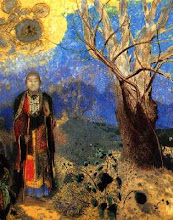Here is my third Faithbook post from February 21st, 2008.Today was my favorite day so far in Living Religions of the East. Dr. Smith (Fred) and I have been lecturing for the last week on Chinese religions and today he had us sit with our eyes closed for two minutes of meditation. I'm not sure what the other students thought of this but I fully appreciated it.
All day I had been feeling grouchy and I think I have finally caught the flu. I've had a serious headache since this morning and I just wanted to go home and lie down until tomorrow. Those two minutes of informal sitting were just what I needed. I was reminded that even though my head is throbbing, the pain is only being felt in a fraction of my body, the rest of which feels fine and normal. Why should I let a pain in five percent of my body cause me to ignore the ninety-five percent that is feeling no pain? And why should I let my attitude about the pain devolve into outright suffering? The equation seems to go something like this: pain + bad attitude = suffering. And like my mom always told me while I was growing up: "change your attitude!"
Two other interesting things happened in class today. The first was a seemingly off the cuff statement by Dr. Smith that I thought was absolutely brilliant. He was explaining how meditation can help you see beyond the seemingly ordered and permanent Self that you identify with into all the chaotic non-self elements underneath. Fred said, "Order is just a quarter of an inch thick, but chaos goes all the way to the bone." Take that Lao Tzu!
A few minutes later, Fred mentioned koans. He explained to the students that Koans are something like Zen riddles or phrases to meditate on such as: "what is the sound of one hand?" or "why did Bodhidharma come to the east?" Dr. Smith said the most paradigmatic Koan was "Does a dog have Buddha nature?" He looked at me and asked, "Well? Does a dog have Buddha nature?" And without thinking I yelled the traditional answer to the Koan: "Mu!"
Dr. Smith responded, "I don't think they got that," so I said in a louder voice: "MU!"
This display left me feeling very pleased with myself. (Oh Ego, you idiot!)
Dr. Smith turned towards me again and asked, "Now what does Mu really mean?" I replied: "In Japanese it means not or without."
"No," said Dr. Smith in a complete dead-pan, "Mu just means Mu!"



No comments:
Post a Comment